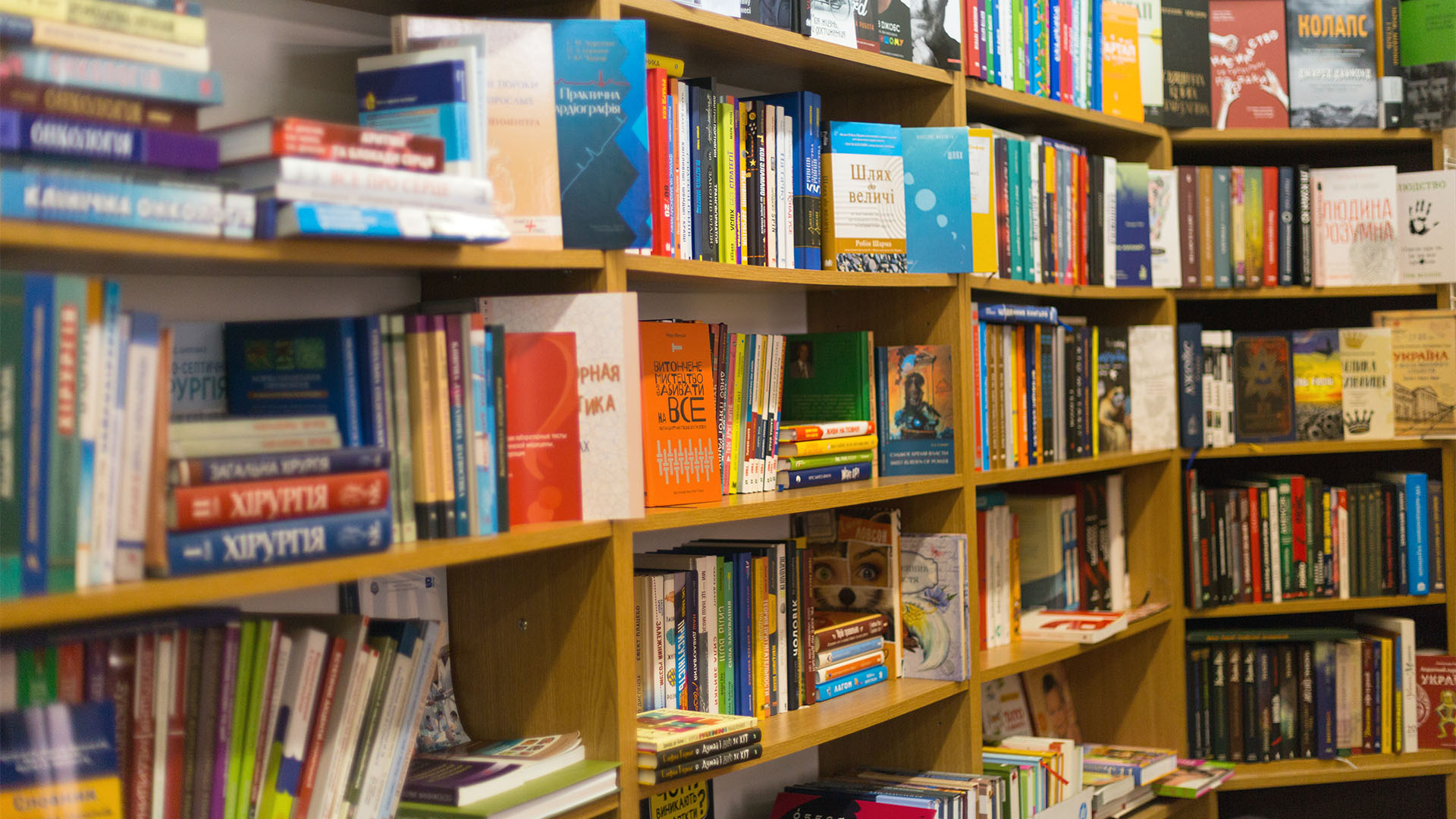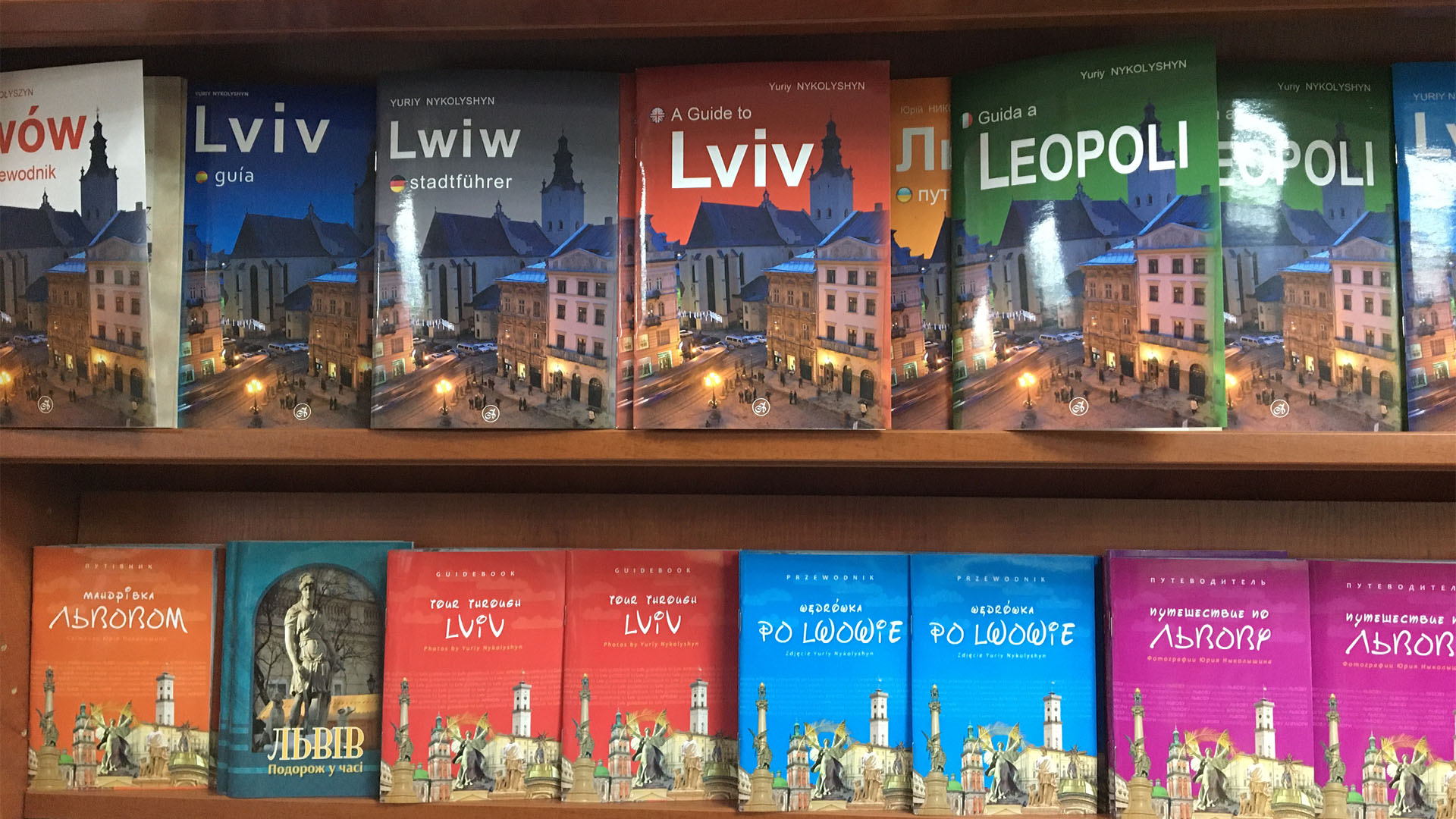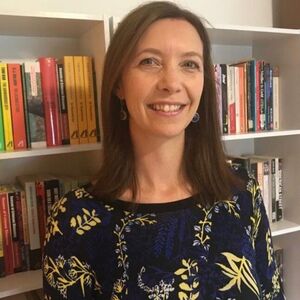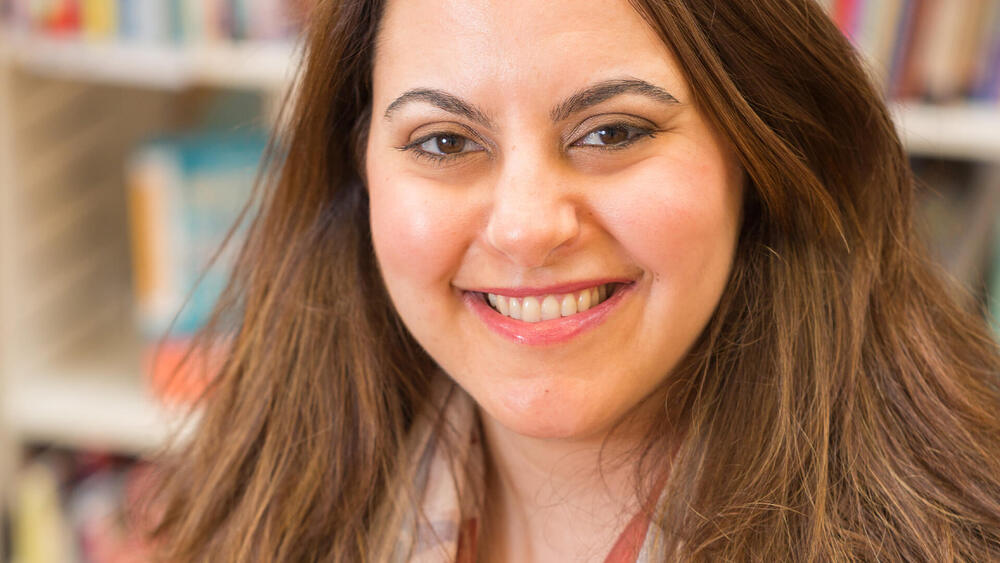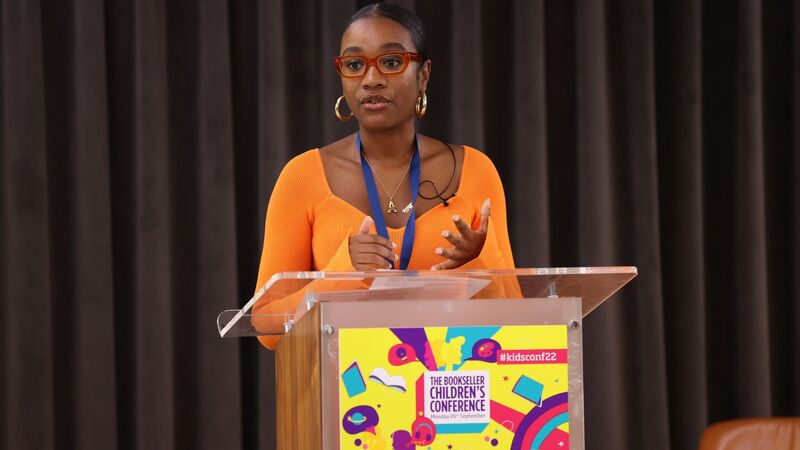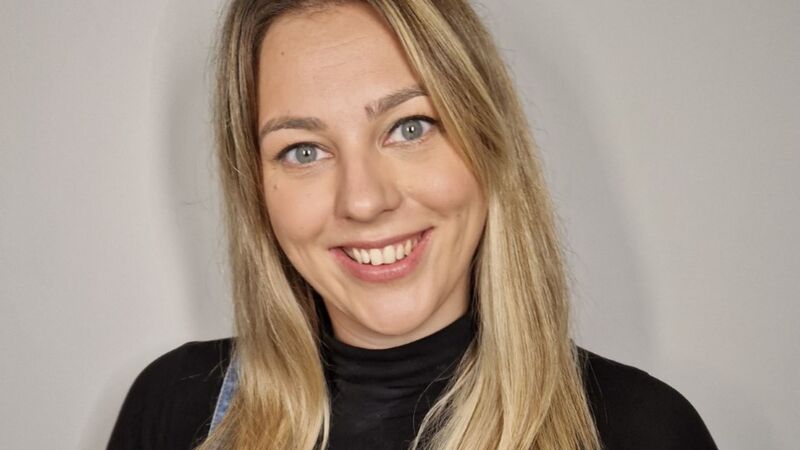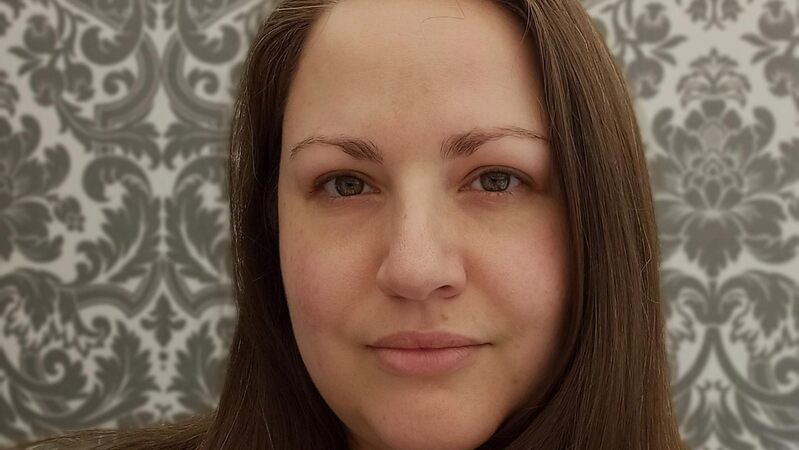You are viewing your 1 free article this month. Login to read more articles.
Publishing in Ukraine: a personal response
Following the Russian invasion of Ukraine, publishing professionals there seek solidarity and practical support for their work.
On 24th February 2020, I arrived in Kyiv for a 10-day research trip. I had been commissioned by the British Council to undertake a review of the publishing sector in Ukraine, and met with publishers, authors, librarians, booksellers, printers, festival organisers and literary activists, travelling from Kharkiv in the east to Lviv in the west. The spirit of creativity and innovation evident in the creative sector made a deep impression on me, as did the warmth and generosity of everyone I met. Exactly two years later, on 24th February 2022, Russian forces invaded Ukraine.
This war seemed unthinkable even a week ago. Ten days ago, I was in touch with Ukrainian publishers, fixing appointments for the London Book Fair. I had a Zoom meeting with a Ukrainian author, discussing his latest book proposal and his forthcoming book tour of Germany. On Friday, I heard from him via WhatsApp that his home, near the cargo airport in Kyiv, had been lost in the fighting. A colleague in Kyiv messaged to say she was not safe and asked for prayers. The printer I visited in Kharkiv sent an email lamenting the civilian casualties, the 16 children lost in his city. My colleague from the British Council in Kyiv has been sleeping on the floor of the Metro for the past three nights, wearing a diaper and worried that her unborn baby may have been poisoned by toxic gas.
As the publishing industry comes to terms with a new reality over the coming months and years, our Ukrainian colleagues will need more than statements of support
It’s hard not to feel helpless in the face of such unprovoked and unjustified aggression. As publishers, we may think there is little that we can do. And yet, the main demand from publishing colleagues in Ukraine is to spread the word about their work. An email from the Book Arsenal festival was clear in its request: “We kindly ask you in these challenging days to share publicly the successful stories of co-operation with Ukraine” in order to “defend the positive milestones that we have mutually achieved”.
In that spirit of solidarity, we have summarised here some of the valuable work that has been taking place in the publishing sector in Ukraine. The people now referred to as “refugees” in the global news reports are our industry colleagues. They write books, curate literary festivals and run publishing companies. We have consciously named participants in these projects and initiatives, and referenced works so that they are documented here.
Statements of support have poured out over recent days, from bodies including PEN International, the Federation of European Publishers and the Frankfurt Book Fair.
Yet, as the publishing industry comes to terms with a new reality over the coming months and years, our Ukrainian colleagues will need more than statements of support. They will need practical help and commercial relationships. As a sector, we should seek to develop links with Ukrainian publishers. Use Ukrainian printers. Acquire and promote work by Ukrainian authors. Read the British Council report on publishing in Ukraine, and understand how we can help plug the skills gaps, be that in developing translation, sales or editorial expertise.
In 2021, one of the biggest challenges facing the Ukrainian publishing sector was the difficulty of raising the visibility of Ukrainian writers in overseas markets. Ukraine suffers from no lack of visibility now.
Ukraine has a great deal to offer international publishing partners. The accomplished and distinct voices of celebrated contemporary Ukrainian authors, very few of whom are translated into English, offer an exciting prospect for foreign publishers. Children’s books and graphic novels with high-quality illustration and design also present an attractive product for export. There are high-quality printers based in Ukraine, primarily in Kyiv and Kharkiv. One of the largest facilities, Unisoft, offers cutting-edge technology and, as of 2021, has the capacity to produce up to one million books in hardcover and 1.5 million books in softcover per month.
Ukraine has a vibrant literary sector: The Book Arsenal Literary Festival (Mystetskyi Arsenal) in Kyiv won the Literary Festival Award at the LBF International Excellence Awards in 2019; Odessa and Lviv are both Unesco Cities of Literature; and the popularity of authors such as Yurii Andrukhovych, Oksana Zabuzhko, Andrey Kurkov and Serhiy Zhadan has led to talk of a “rebirth” of Ukrainian writing. Beautifully produced titles are on sale in retail stores across the country.
Excellent work is already being done to promote Ukrainian literature abroad, primarily by the Ukrainian Book Institute (UBI). The rights catalogues compiled by UBI and translated by the TAULT translation house contain publisher profiles and highlights key titles and new books. A Translate Ukraine grant programme was launched in 2020 to encourage foreign publishers to acquire rights from Ukrainian publishers.
Organisations such as the Edinburgh International Book Festival, the Unesco Creative Cities network, the British Centre for Literary Translation and the British Council have been engaging in and facilitating partnerships with UK publishers and writers for several years, most recently the British Council International Publishing Fellowships programme. A summary of their work follows.
Florence Reynolds, Peggy Hughes, Chris Gribble
National Centre for Writing
The International Literature Showcase (ILS) is a partnership between the National Centre for Writing and the British Council. We have supported the Book Arsenal Festival through the programme’s combination of symposia, writer showcasing and seed funding. As part of our ILS work, we have featured and collaborated with Oksana Shchur, curator of the Literature Laboratory, a project for integration and development of Ukrainian and foreign writers, translators, book designers and publishing managers. Oksana came to Norwich in person in 2017 and participated online in 2020.
In 2017, we supported UK writers Sophia Walker, Raymond Antrobus and David Szalay to take part in the Arsenal’s “Spotlight on Modern Literature Trends” events, in which they connected with readers, writers and publishers in Ukraine to exchange experiences and ideas about spoken word and writing for radio.
As part of our Emerging Translator Mentoring programme, we’re supporting Hanna Leliv, a freelance literary translator based in Lviv. Among her translations into Ukrainian are texts by Kazuo Ishiguro, Ernest Hemingway, and Stephen Hawking. Her translations of contemporary Ukrainian literature into English have appeared in Asymptote, Washington Square Review, the Adirondack Review, the Puritan, and Apofenie. She teaches a literary translation workshop at the Ukrainian Catholic University in Lviv. The programme provides her with mentoring, tailored support and insight into the translation industry.
As a fellow Unesco City of Literature, Norwich City Council was one of the many to light up its City Hall in the colours of the Ukrainian flag last night and will do so again no doubt in the days ahead. The Leader of our City Council and the Lord Mayor are writing directly to our sister Cities of Literature in Lviv and Odessa to offer our support and solidarity now and in future.
Nick Barley
Edinburgh International Book Festival
Since 2019, the EIBF has been working with Book Arsenal and the British Council in a partnership. Originally, this was intended to take place at the Book Arsenal and the Book Festival in 2020, but has been delayed due to the Covid pandemic. I was due to attend the Book Arsenal in 2020, but sadly we had to postpone the visit. Ultimately, the intention is to build long-term exchanges involving Scottish and Ukrainian authors and we fully intend to pick up the project as soon as the situation allows.
Meanwhile, over recent years we have welcomed several Ukrainian authors to the festival including Serhii Plokhii, the author of the Baillie Gifford Prize-winning book Chernobyl, and novelist Andrey Kurkov, whose recent novels published in English include The Bickford Fuse and Grey Bees.
Duncan Large
British Centre for Literary Translation
The British Centre for Literary Translation (UEA, Norwich) is partnering with the Ukrainian Institute to offer a week-long literary translation workshop from Ukrainian into English at this year’s BCLT summer school, which is run in partnership with the National Centre for Writing. The Ukrainian workshop strand will be led by writer and translator Olena Jennings, and 10 translators will be offered full bursaries to take part in the workshop free of charge. Participants will work with author Artem Chekh, translating excerpts from his novel Who Are You?, published by Meridian Czernowitz. The BCLT Summer School will be held online from 18th to 22th July, and the Ukrainian workshop strand is part of the programme UK/Ukraine Season of Culture 2022. Details on the workshop can be found here (application deadline 22nd April 2022).
Jim Hinks
British Council
In recent years the British Council, working with the UK publishing and literature sector, has supported a range of activities to forge connections and build capacity between the UK and Ukraine. Among other activities, we have:
- Supported a Ukrainian language mentor/mentee on the NCW Emerging Translator Mentorships 2021–22.
- Supported Ukrainian as one of the featured languages at the forthcoming 2022 BCLT summer school.
- Supported the programming of UK writers at literature festivals in Kyiv and Lviv through our partnership with the National Centre for Writing on the International Literature Showcase.
- Supported Alternative Albion (2016–17), a collaboration between The Birmingham Literature Festival, Writing West Midlands, and Book Arsenal (Ukraine) which forged links between writers and audiences in Ukraine and the West Midlands.
We have also directly delivered a range of professional development activity including:
- The International Publishing Fellowship (2019–21 edition), in which 12 early-career publishers from the UK, Ukraine, Georgia and Turkey participated in professional development activities, scoping trips and bursaries.
- "3 x 3" Publishing mentorships (2018), in which 3 early-career publishers in Ukraine were mentored by publishers from the UK sector.
- Writing for Radio and Radio Production professional development training (2018–19), with Suspilne Radio and Book Arsenal (Ukraine) and Rocket Media Productions (UK).
Arthur Thompson
British Council, publishing fellow (2019-20)
I will be forever grateful to the British Council fellowship because it connected me to counterparts in Ukraine and opened up the world of Ukrainian literature and poetry. I was introduced to Serhiy Zhadan, Oksana Zabuzhko and Yurii Andrukhovych, and later explored the works of Taras Shevchenko, Ivan Franko, Iryna Starovoyt, Hryhorii Skovoroda, Larysa Denysenko, Andrey Kurkov, Lina Kostenko and Yuriy Vynnychuk, among many others. To show solidarity for a culture that has been under threat for much of its history, I recommend seeking these authors out. For English-language translations, look to Jantar Publishing and Kalyna Language Press in the UK; Lost Horse Press, Deep Vellum, Spuyten Duyvil, Yale University Press, Harvard University Press, Academic Studies Press and Amazon Crossing in the US; Glagoslav Publications in the Netherlands; and Osnovy in Ukraine. The fellowship partnered me with Mykola Kovalchuk, one of the most knowledgeable and generous people I have had the pleasure of meeting. I do not know how, as an art director, designer and typographer based in Kyiv, he will fare in the coming months.
This year, I will be releasing a book of interviews with publishers and translators based in Europe and the US, on the topic of Ukrainian literature in translation. This project would not have been possible without the financial support of the British Council and the confidence provided by the fellowship and its constituents. I sincerely hope we continue to support the exchange of art, ideas and language, as well as funding, and widen the audience for Ukrainian art.
Emma Warnock
British Council, publishing fellow (2019-20)
As a small publishing company in Northern Ireland, No Alibis Press depends on connections with elsewhere, particularly the market in Great Britain and Ireland. In 2019, the British Council provided the opportunity to connect with overseas publishing colleagues through an international fellowship programme, where I was fortunate to be paired with Kateryna Nosko of IST Publishing, based in Kyiv. Kateryna, along with Anastasia Leonova and Borys Filonenko, publishes exquisitely produced books on art and culture, placing Ukrainian art, theory and practices on an international stage. IST Publishing focuses on Ukrainian art processes (such as Nosko’s Where Curating Is), but their catalogue includes translations of work by international theorists Hal Foster, John Berger and Hans Ulrich Gumbrecht, reflecting their outward-looking mission to connect and collaborate.
During a week in London, hosted by the British Council, the time Kateryna spent in Belfast with us meeting publishers, designers and gallery directors, and the tour of Ukrainian publishing (unfortunately moved online due to the pandemic) hosted by Daria Stokoz (British Council Ukraine), I learnt that conversations about art at their most beneficial can, and should, be international. That we share the same publishing challenges and can work together to bring international artists, writers and critics to new audiences. We look forward to future opportunities for collaboration with our publishing colleagues in Ukraine.
Clare Hodder
Rights2
In May 2020, Rights2 consultants were invited by the Book Arsenal festival in Ukraine to run a workshop as part of their "Rights Now" event. The workshop covered selling translation rights online, and included topics such as how to identify potential licensees, curating content to pitch and licensing strategy. In addition, we carried out an in-depth analysis of more than 30 Ukrainian publishers’ rights guides in order to give feedback on how these could be made more impactful.
We were really struck by the enthusiasm of the publishers and the broad selection of high-quality books being showcased. What really stood out were the large number of beautifully designed and illustrated children’s books coming out of Ukraine.
We hope that Ukrainian publishers are successful in growing their translation rights sales so that more of these special books can be enjoyed all around the world.




